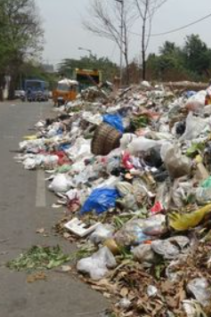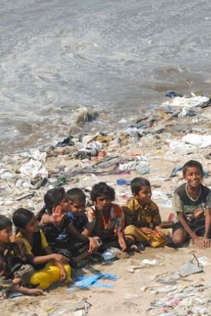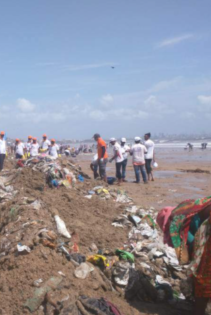Please send questions not addressed in the FAQ to Contact@CAPPIndia.in. We will update this FAQ from time to time based on the questions asked/answered.



Frequently Asked Questions
THE THREE THEMES
An Initiative is a project, program or technology solution that has demonstrated, proven results in reducing, repurposing or reusing plastics. An Initiative can be led by a company, an NGO, local government, individuals acting together, or as a public-private-partnership. An Initiative has a leadership team. The Initiative can be already completed, is an annual happening, or is ongoing. What matters most is that the Initiative gets results, and even better, has measurable data, or at least provides clear before/after anecdotal evidence. An Initiative can be big or small. A small Initiative with a clear start, middle and end that yields excellent results could be a great example huge if replicated everywhere in India. A large Initiative that takes a long time to plan, lots of resources and is also a large success is equally valuable.
What constitutes an Initiative is in the team’s eyes. Your goal is to show why it has value to be repeated again and again by others, and how it can be replicate, and what has to happen to do so. Lastly, the Initiative can be for the local community, or broader consumer-focused, or aimed at businesses (industrial or retail), or aimed at local municipalities and their actions. It can focus on educational awareness or real actions. In summary: A team looking to select an Initiative should focus on what was implemented, and the real difference it made.
A proven Initiative is not a concept that has yet to be proven or gain traction (see Theme Two). A
Theme One Initiative (for this case study competition) is not a program or project that just launched, without any actual proof that it is reducing or preventing plastic waste. An Initiative is not a one-off, one-time successful beach cleanup, for example, completed by 10 people or even 100 people, yet with little or no follow up. An Initiative is not a science technology in the lab or even a prototype tested. To reiterate, a Theme One Initiative is not an idea.
All of the above! While Theme One features proven technology solutions, projects or programs, a Theme Two innovation can be categorized as a new technology solution or conceptual idea, new project or new program that is or will be operating, but has yet to show results that it reduces or prevents plastic waste. It should have the ability to be replicated consistently by others if given similar resources at another location or use
case.
A localized waste problem is a visual, physically-located waste eyesore within a local community, i.e. nothing
more complicated than a pile of municipal waste or predominantly plastic waste pile that the student team wants to see permanently cleaned up.
As the focuses of the three themes differ, their templates must also differ. Each template is designed to help the student team tell the story of the initiative selected as it pertains to the theme selected.
That’s easy – the initiative that excites your team to showcase it to the world; where your team wants to bring
out why and possibly how it should be replicated by other organizations or local groups within India and the Indian Subcontinent.
Absolutely. We strongly encourage each team to reach out to the stakeholder’s top leaders to to conduct one or more interviews, as well as engaged artners and community members. These irect interviews should provide a great source for completing a theme’s pplication template. The Make the Case artners would be happy to
Based on the feedback received by student teams from Season One, the most important attribute in
selecting a project or program or innovation to “make the case” is the personal accessibility of a prominent member of the stakeholder’s organization, and their willingness to share information and insights with the student team. While selecting an initiative from a more well-known stakeholder could be advantageous due to the amount of information publicly available, the difficulty may be in finding anyone in the organization willing to talk and share insights. Note, we hope student teams will share their Case Studies with their stakeholder. In Season One, teams that selected smaller organizations doing some amazing work found such interactions with one or two key execs to be very rewarding and very insightful. And usually this translated to much better
Case Study submissions and presentations.
It should be noted,
however, that multiple teams can select the same initiative, although it stands
to reason that a stakeholder may or may not be as receptive to participating in
a second team’s case study interview or a third team. Thus, the sooner a team makes contact with a
stakeholder’s management team to set up an interview, the more likely they’ll
receive a strong interest to participate.
In January 2020, Ocean Recovery Alliance published a report called “Crafting High-Impact Voluntary Commitments To Reduce and Prevent Marine Litter.” For the report, Ocean Recovery Alliance reviewed 580 public commitments made by global stakeholders from 2014-2018. From these 580 commitments, it developed the PCC Codes (i.e. Plastic Category Classification Code ) which is a taxonomy of potential types of Initiatives by stakeholder. The PCC Codes may be helpful in your team in identifying an Initiative to champion.
GENERAL COMPETITION, REGISTRATION AND PRIZE MONEY
Rather than duplicate information, please go to the registration page
https://cappindia.in/register to read the steps required to register and submit your competition entry.
Nepal, Bhutan, Bangladesh, Sri Lanka, and the Maldives.
Each team will be required to submit their application via their F6S team submission area. This will include the to-be-completed Word template for each theme, as well as a small number of additional questions that need to be completed within the team’s submission area. These questions are the same questions asked of each team, regardless of theme selected.
Not at all. We know finding an Initiative that your team feels is a powerful example of an Initiative that other stakeholders in India could replicate will require time, effort and research. As Step Two, we will ask each team leader to share the Initiative selected no later than February 15th once the team has decided which Initiative to champion.
Teams of 3 or 4 students can be from multiple universities. For the competition, we will only judge teams of 3 or 4 students. Submissions from teams of 1 or 2 students, or 5 or more students will not be eligible.
No, each team needs to designate a Team Leader. She or he will sign up for the team, and during the sign-up process, there are four questions to answer, including listing each team member, email address and school. We’ll communicate with the team leader throughout the competition.
We will invite the top 3 teams for each Theme to be finalists where they will be allocated time for “make their case” presentations during the finals. Please note: We are looking for solid submissions from teams that have clearly put time into presenting their Initiative in the best light possible.
We are in the process of securing sponsorship that should provide award prize money for
all winning teams. However, please proceed with the understanding that the awards, at this time, do not have any cash prizes, and are currently listed on each theme page. In sum, there may not be any cash prizes
awarded.
Rather than duplicate information, please go to the registration page
https://cappindia.in/register to read the steps required to register and submit your competition entry.
to be added
Each team will be required to submit their application via their F6S team submission area. This will include the to-be-completed Word template for each theme, as well as a small number of additional questions that need to be completed within the team’s submission area. These questions are the same questions asked of each team, regardless of theme selected.
Not at all. We know finding an Initiative that your team feels is a powerful example of an Initiative that other stakeholders in India could replicate will require time, effort and research. As Step Two, we will ask each team leader to share the Initiative selected no later than February 15th once the team has decided which Initiative to champion.
Teams of 3 or 4 students can be from multiple universities. For the competition, we will only judge teams of 3 or 4 students. Submissions from teams of 1 or 2 students, or 5 or more students will not be eligible.
No, each team needs to designate a Team Leader. She or he will sign up for the team, and during the sign-up process, there are four questions to answer, including listing each team member, email address and school. We’ll communicate with the team leader throughout the competition.
We will invite the top 3 teams for each Theme to be finalists where they will be allocated time for “make their case” presentations during the finals. Please note: We are looking for solid submissions from teams that have clearly put time into presenting their Initiative in the best light possible.
We are in the process of securing sponsorship that should provide award prize money for
all winning teams. However, please proceed with the understanding that the awards, at this time, do not have any cash prizes, and are currently listed on each theme page. In sum, there may not be any cash prizes
awarded.
Rather than duplicate information, please go to the registration page
https://cappindia.in/register to read the steps required to register and submit your competition entry.
to be added
Each team will be required to submit their application via their F6S team submission area. This will include the to-be-completed Word template for each theme, as well as a small number of additional questions that need to be completed within the team’s submission area. These questions are the same questions asked of each team, regardless of theme selected.
Not at all. We know finding an Initiative that your team feels is a powerful example of an Initiative that other stakeholders in India could replicate will require time, effort and research. As Step Two, we will ask each team leader to share the Initiative selected no later than February 15th once the team has decided which Initiative to champion.
Teams of 3 or 4 students can be from multiple universities. For the competition, we will only judge teams of 3 or 4 students. Submissions from teams of 1 or 2 students, or 5 or more students will not be eligible.
No, each team needs to designate a Team Leader. She or he will sign up for the team, and during the sign-up process, there are four questions to answer, including listing each team member, email address and school. We’ll communicate with the team leader throughout the competition.
We will invite the top 3 teams for each Theme to be finalists where they will be allocated time for “make their case” presentations during the finals. Please note: We are looking for solid submissions from teams that have clearly put time into presenting their Initiative in the best light possible.
We are in the process of securing sponsorship that should provide award prize money for
all winning teams. However, please proceed with the understanding that the awards, at this time, do not have any cash prizes, and are currently listed on each theme page. In sum, there may not be any cash prizes
awarded.
SUBMITTING THE CASE STUDY ENTRY
Yes, it will be expected that teams should answer every question in a Theme’s template. If for some reason the question is impossible to answer due to the nature of the Initiative selected, please do your best, and feel free to qualify your response, accordingly.
Absolutely. 3 expert reviewers will be asked to read and score your team’s Case Study and submitted questions asked to each applicant. Each Theme will have a distinct scorecard that will be used by reviewers, and the reviewers will also be asked to share their comments, too, as appropriate, with the Make the Case team.
Each theme will have up to 2 winners: First Place and Runner-Up. The “Make the Case” Working Team will select these 2 winners based, foremost, on two scores:
1) The cumulative scores of each team’s Case Study submissions. Each initiative will have three reviewers, each asked to score the Case Study itself (80%) and also the answers to the same 4 questions asked to each student team
about their selected initiative (20%). In addition, the Working Team will also take into consideration
subjective comments by the reviewers, too, in case of similar point scores.
The Working Team will select the 3 finalists to present during the finals webcast to compete for the first place winner overall, and top two awards for each theme.
2) To determine the overall winner and theme winners, student teams will carry forward their scores from the Case Study round (worth 75%) and the Working Team will add the scores from the “live” judging round (presentations by the student teams) which will count for the other 25%.
